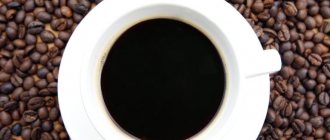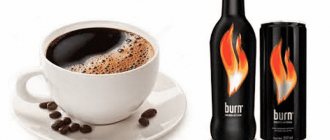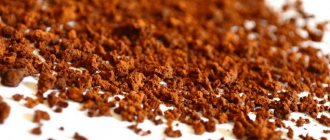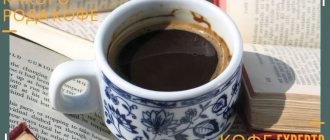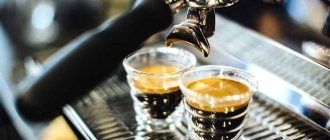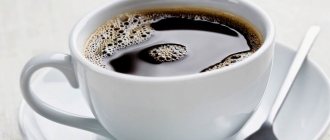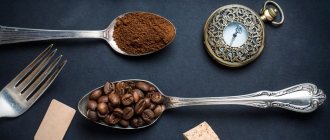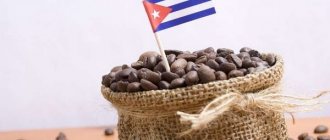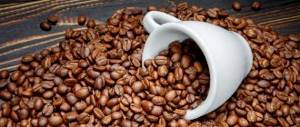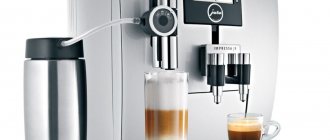When you wake up in the morning, or feel low in energy after lunch, what do you prefer as a source of energy: coffee or an energy drink? You may just need a good dose of caffeine, but it's the way you get it that really matters. Some people choose Red Bull, Monster, Adrenalin Rush, Burn or other drinks, others pour themselves another shot of espresso. We looked at the main parameters of both types of drinks to determine which is more harmful: coffee or energy drinks.
Calorie content of coffee and energy drinks
A high calorie count doesn't necessarily mean a food or drink is unhealthy (after all, your body needs calories to function properly). However, it's important to remember where you get your calories from and look for healthy, wholesome sources.
For comparison:
- There are no calories in coffee. More precisely, there are, but in a serving of espresso (or Americano) there are only 2 of them, and in a shot of espresso (or Americano), it’s good if there are 4-5. Given the daily norm of even the most strict diet of approximately 1500 kcal, this is generally unimportant.
- A can of a typical energy drink like Monster contains 110 calories, which mostly come from added sugar.
Sugar has calories, but you won't get any beneficial nutritional value for your body; it's a fast carbohydrate. Coffee is better for long-term activity, and you don't have to count the number of calories in it.
Sugar content in coffee and energy drinks: which is more harmful?
- Even if energy drinks are advertised as “sugar-free,” they contain artificial sweeteners, which are best avoided from your diet anyway.
- One Red Bull (250 ml) contains 26 grams of added sugar, which is more than half the recommended daily amount in a typical 2,000-calorie diet.
- Sugar-free versions of energy drinks are not very good for you because they contain artificial sweeteners such as aspartame and sucralose.
- But coffee can still be sweet and low in calories: try all-natural stevia instead of sugar and replace the cream with almond milk, which has a great taste, aroma and slight natural sweetness.
If you're concerned about your sugar intake, add just a spoonful of sugar or a natural sweetener to your coffee.
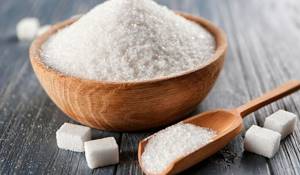
Is it possible to mix coffee with energy drink?
Despite all the warnings of doctors, many people mix coffee and energy drinks so that the effect of vigor and increased performance lasts as long as possible. Quite often, this mixture is used by students during a session or by young people who constantly relax in nightclubs and do not want to fall asleep in the midst of a party.
Caffeine and other substances contained in such a mixture negatively affect the general condition of the body. Due to the powerful release of adrenaline, pulse and blood pressure sharply increase, brain activity is stimulated, and fatigue, hunger and drowsiness completely disappear. In addition, the process is accompanied by inexplicable euphoria, hyperactivity and increased mental arousal.
In moderation and in the absence of chronic fatigue, such drinks can indeed be consumed by drivers, athletes or people working night shifts. This will help improve reaction and performance. But if the body is exhausted, no energy drink will help relieve fatigue.
Coffee mixed with an energy drink completely turns into an explosive mixture. Constant consumption of such a drink will negatively affect physical and mental health.
Must read: Iced Glace coffee for a hot summer day
Where is there more caffeine in coffee or energy drinks?
If you think that energy drinks contain more caffeine because it makes you feel more alert, this is not true. A standard 250-gram can of Red Bull has 80 mg of caffeine, while a large Americano from a machine has about 90 mg. Unless you're drinking from a large can, the amount of caffeine will be roughly comparable. There are energy drinks with an increased dose of caffeine, and there is decaf coffee. Keep in mind that a healthy adult can consume up to 400 mg of caffeine per day. In situations of stress or fatigue, this dose is reduced.
To avoid an attack of tachycardia, tremors in the hands and general weakness, it is worth controlling the amount of caffeine you get from any drink.
Although coffee contains more caffeine, additives in energy drinks, such as taurine, act as enhancers that can help avoid energy crashes and enhance athletic performance. So if you need a caffeine boost before you hit the gym, an energy drink can help you perform better in the gym.
A frequently asked question is: how many cups/mugs of coffee are there in energy drinks, which is more harmful? The answer is about one cup per 250ml jar.
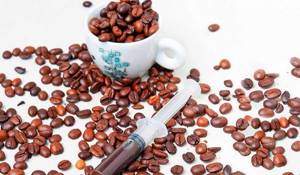
Caffeine
It is not recommended for an adult to exceed the threshold of 300 mg of caffeine per day. An average 0.5 liter can of energy drink contains 150-160 mg. This means that you should not consume more than two cans per day.
But even two is too many. In addition to caffeine, you get an automatic bonus in the form of a bunch of harmful substances and especially sugar. Some jars contain more than an entire package of chocolate bars. We'll talk about this below.
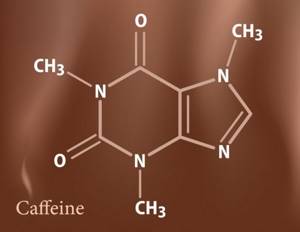
As for caffeine, the most correct option would be to choose an energy drink where the dose is large enough to limit yourself to one can. This is in case the standard 150 mg caffeine hit isn't enough for you.
Another option is, on the contrary, to reduce the dose of caffeine so as not to overload the body. Recommended for anyone who rarely drinks coffee, energy drinks and other caffeine-containing products.
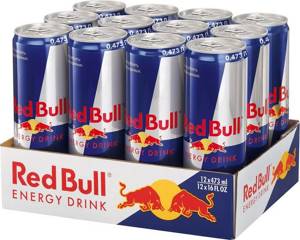
Let's move on to specifics. Red Bull gives us the golden mean of 160 mg. The least caffeinated drink is “Flash Up” - it contains only 109 mg of caffeine per 0.5 liter. But the maximum caffeine content of all energy drinks on the Russian market is “Bern” - as much as 175 mg per 0.5 liter.
Not to say that it is much more than that of Red Bull, but there is still a difference. For example, drinking two cans of Burn will put you more than one cup of coffee over your limit. Keep this in mind.
What is better in composition, what is more harmful: energy drink or coffee
By drinking espresso or Americano you, of course, will not get taurine, ginseng, mate and B12.
The good news is that you don't need nearly as much of these stimulants and vitamins on a daily basis. Some are designed to enhance the effects of caffeine, while others are added because it sounds good, even when there is no clear scientific evidence to support its effectiveness. Energy drinks contain a long list of ingredients such as glucose, sodium citrate, and artificial colors and flavors. They also usually contain extra vitamins, such as B12 and calcium, which should help give you an energy boost. However, your body does not absorb added vitamins that are naturally found in whole foods, so you should not rely on these added vitamins when making your choices.
Of course, B12 is a healthy and important vitamin, but most people get enough of it from their regular diet.
Coffee just contains coffee. Well, yes, Arabica contains more than 2000 compounds, but no one added anything synthetic or unnecessary to it for greater benefit. If you order coffee cocktails, the list of ingredients, of course, expands, but you can still choose a pure black at any cafe.
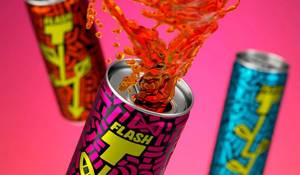
Theanine, ginseng, guarana
Let's start with guarana, since it is present almost everywhere. Everything is simple with her. This is an evergreen shrub with big-eyed fruits, the extract of which is added to energy drinks as a natural source of caffeine. You don't need to know anything more about her. The caffeine indicator takes it into account perfectly.
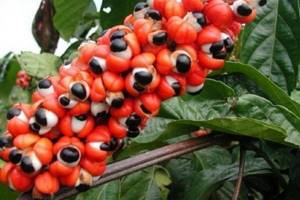
Ginseng is not present everywhere. Of the unique ginseng energy drinks, I could immediately remember only “Burn”. It relieves fatigue and improves brain function. It's a small thing, but nice. But don't expect miracles from him. It's just better with him than without him.
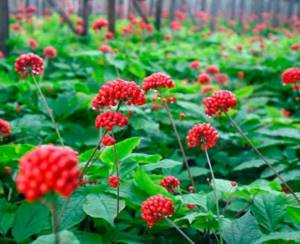
L-theanine in energy drinks is a wild rarity. But “Genesis” boasts about it - one of the most delicious energy drinks in my memory. It is essentially an amino acid found in green tea and some mushrooms. It invigorates and tones at the same time - in a word, it is something between caffeine and taurine.
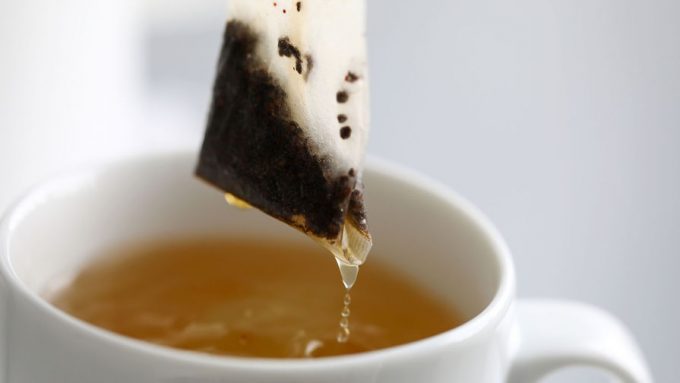
If you find theanine energy booster, you can try it for its complex effects. For theanine to harm you, you would have to take a very large dose. Let's just say that if you take it as an energy drink, you will have time to die twice from something else.
Different quality of energy in coffee and energy drinks
Coffee can charge you with both mental and physical energy. While sipping a fragrant Americano, most people are able to concentrate perfectly, whether on work projects or driving. From this point of view, coffee is perfect for office workers, students, and in any situations where you need to be attentive and concentrated.
Energy drinks, according to many people, provide physical energy due to the large amount of sugar and stimulating additives. They also “bring you to your senses,” but at the same time it is often impossible to do creative work, complete a coursework, or come up with a presentation. I don’t want to sleep, but I don’t have concentration either, there is only the physical energy of the body.
Mixing two different types of stimulants to get the maximum effect from each is not recommended.

Effect of energy drinks
Energy drinks are extremely popular, especially among young people. This drink also helps to cheer you up, but constant use causes insomnia, depression and does not allow you to fully rest.
Bright cans of energy drinks contain a whole range of substances:
- Caffeine stimulates brain activity and increases the frequency of contraction of the heart muscle (pulse) by about 6 times;
- Taurine acts as an antioxidant, stimulates metabolism, increases endurance and concentration;
- Levocarnitine is a substance that also accelerates metabolic processes;
- Guarana benefits the body only in small quantities, but with constant use it causes insomnia and headaches;
- Melatonin helps regulate sleep-wake cycles;
- Matein reduces the natural feeling of hunger.
Be sure to read: How to make cheese coffee and is it tasty?
In addition, energy drinks usually contain glucose and fructose (to reduce the body's need for sleep and rest), as well as phenylamine, which enhances the taste of the drink.
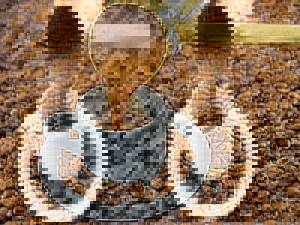
Each of these substances in moderate quantities is beneficial for the body, but taken together they are harmful to health. Energy drinks are considered especially dangerous for teenagers. An overdose of energy drinks can cause vomiting, exacerbation of kidney and stomach diseases, arrhythmia, and in severe cases, hallucinations and loss of orientation in space.
If a person has consumed an energy drink, drinking coffee or other drinks containing caffeine (including strong tea) is prohibited for 4 hours. Otherwise, the caffeine content in the blood will be so high that mental and physical health problems will appear.
Prices for coffee and energy drinks: which is more harmful to the budget?
250-330 ml cans of Red Bull or Burn cost approximately 90–100 rubles. Do you need two jars overnight? For 150–200 rubles you can buy a 250 gram pack of coffee. If you consider that for one cup the standard amount of ground coffee is 7 g (a heaping teaspoon or one pour into the coffee machine), it turns out that you get approximately 35 cups from one pack. So if we are talking about budget and savings, the question of what is worse, coffee or energy drink, is not even worth it.
If you buy a drink in a coffee shop (like you would grab an energy drink in a store), a serving of Americano will cost the same 80–100 rubles. But without chemical additives, a natural product. If you buy a drink from a coffee machine in a store, it will be even cheaper.
Alternative to Energy
So, we know the composition and functionality of energy drinks! We can make something similar, much cheaper and without preservatives. Therefore, we buy: caffeine (in any sports nutrition store), taurine (there), some kind of pentovit or neuromultivit (B vitamins) and something like a small bun or chocolate. For a boost of energy, it will be enough to mix 200-400 mg of caffeine, 1 gram of taurine, drink vitamins and eat sweets. But you can simplify everything to water, caffeine and taurine.
Let's sum it up
- There are no calories in coffee, and about 100 kcal in energy drinks per 250-gram jar.
- Your Americano can be sweetened with natural stevia. The finished product contains either a lot of sugar or artificial sweeteners.
- In terms of caffeine, drinks are approximately the same, but artificial additives often enhance its effect, so the answer to the question of what is more effective, what invigorates better, coffee or energy drink, is ambiguous.
- If we talk about the composition, you yourself understand what is healthier – natural coffee or synthetic energy drink.
If you have no other choice, there's nothing wrong with drinking energy drinks every now and then—it's almost like drinking soda. But if you have the opportunity and you are wondering which is more harmful, coffee or energy drinks, choose coffee because it is a natural source of caffeine. If you drink your coffee black, you don't have to worry about calories, sugar, or additives.
Who shouldn't drink energy drinks?
Contraindications to the use of energy drinks:
- Children and teenagers
- Diabetes
- All diseases of the cardiovascular system
- Diseases and disorders of the central nervous system
- Kidney and liver failure
- Pregnancy and lactation
- Peptic ulcer of the stomach and duodenum
- Gastritis
- Headaches, migraines
- Use of any medications
To drink or not to drink such a drink is everyone’s business. But if you already hold the jar in your hands, be sure to consider the following:
- Not all information on the bank is true.
- Remember the contraindications and think about whether to drink or not, or better yet, consult your doctor.
- Approximately calculate the amount of caffeine that entered the body with coffee or tea before, compare with the dose in the energy drink, compare with the safe daily dose (up to 400 mg of caffeine per day - this is two cups of coffee, for children - 45 mg of caffeine, so energy drinks are very dangerous for children, contraindicated and prohibited).
- Do not prolong the energy effect by increasing the portion of the drink.

